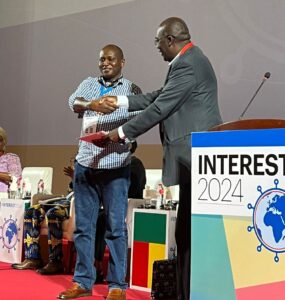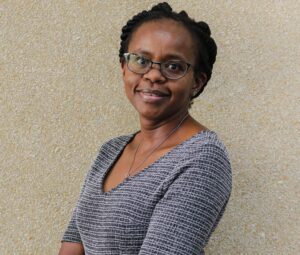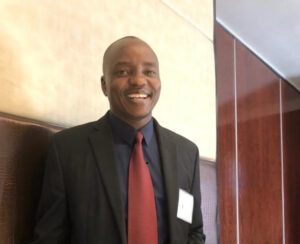Kudus Adebayo, CARTA Cohort Six Fellow – now Graduate, recently joined Cohort 10 fellows for their Joint Advanced Seminar 2 (JAS 2) at the University of the Witwatersrand (Wits) in Johannesburg, South Africa. The seminar took place between May 23 and June 3, 2022. Ann Waithaka, CARTA Communications Officer, took the opportunity to have a chat with Kudus, not only about his experience at the Seminar but also with CARTA over the years.
CARTA fellowship
I am a proud CARTA graduate having completed my doctoral training in 2019 at the University of Ibadan, Nigeria. My research examined the migration and settlement experiences of Nigerians in Guangzhou, China. In retrospect, CARTA was a major turning point in my doctoral journey as it provided access to a wide range of support in many areas of capacity development, which are not explicitly taught in the university. It was an intense process but like many other fellows, I had my peers to rely on for support and could access experts at different levels of scholarly careers to turn to for important learning and guidance.
CARTA has contributed immensely to my growth as an academic and has continued to shape my aspiration towards becoming a research leader with a voice. I have developed in ways that many of my peers have perhaps missed because they have not had an opportunity to participate in a program like this. Therefore, I think that more initiatives with a CARTA-like approach can really transform higher education and research on the continent. When I was close to finalizing my PhD, I was confident that I am on a path, sure of what I must do next to become a serious researcher and understood my mandate as an African researcher based in an African institution. I also graduated from the program without really leaving; my cohort members becoming peers to depend on, younger fellows that I am connecting with and supporting, and facilitators who are now colleagues – everyone tied together with that CARTA vision.
Since graduating, I have been engaged in CARTA activities by providing qualitative research-related support to fellows, mostly during JAS 3. This engagement started just before I completed my PhD and has continued till date. I have been involved with three separate cohorts attending JAS 3, offering recap sessions on qualitative data analysis and writing, as this is part of the key goals of this JAS. This has included giving demonstrations on the use of NVivo and CAQDAS and providing one-on-one support to fellows. Outside the regular JAS, I have been part of the team working to review the CARTA curriculum and developing a Training of Trainers (ToT) curriculum for the mainstreaming phase of this important capacity building initiative for African researchers and universities.
JAS 2 at the University of the Witwatersrand
The first feeling from participating in JAS 2 is the realization that “I have been here before” and the joy of being here to support fellows walking the same path is undeniable. JAS 2 is where fellows come to really refine and finalize what their doctoral research vision is all about. The facilitators have been hands-on in providing guidance and exposing fellows to tools and skills they need to finalize and get their protocols approved in preparation for the field. It is particularly interesting that the facilitators are sensitive to the fact that different fellows are in different places in their work and are working with them accordingly.
I believe my presence alone has been supportive and some fellows mentioned this during a one-on-one conversation over coffee. Beyond that, together with another CARTA graduate, Sara Nieuwoudt (Cohort Four) we worked with facilitators to support learning on qualitative data analysis and use of CAQDAS. I also supported fellows planning to work or working with qualitative approaches in their doctoral research. Being able to share what I have learned, that current fellows could use, was valuable, I believe for them and for myself.
Postdoctoral fellowship
I am currently based at the University of the Witwatersrand for my post-doc fellowship which I began in October 2021 and will run up to September 2022. The Fellowship is offered by the ARUA/Carnegie Early Career Fellowship in the Centre of Excellence (CoE) for Migration and Mobility which is housed at the African Centre for Migration and Society (ACMS), Wits. The fellowship at ACMS has offered me protected time to concentrate on writing, especially finalizing manuscripts and attending peer-reviews on submissions that have now been published.
It has been worthwhile and enriching to be here. I have had the opportunity to participate in a specialized training on migration and health, and shared my on-going research at a seminar organized by the Wits School of Public Health. Currently, I am developing articles and monograph manuscripts based on research I conducted on the afterlives of Nigerian deportees from China. The study is supported by the American Council of Learned Societies (ACLS)’s African Humanities Program (AHP) Postdoctoral Fellowship. I have also secured partial support to participate in a major conference – Conference of the Association for African Studies, taking place in June 2022 in Germany.
Taking stock of CARTA goals
CARTA is meeting its core of objectives. The CARTA vision is manifesting with hundreds of fellows and graduates across different higher institutions of learning and research in Africa. Graduates of the program are taking over the reign as facilitators, focal persons and supervisors while leading their institutions as research leaders and administrators. The “critical mass” of capable thinkers and researchers are well in motion and are already mentoring graduate students. CARTA institutions are also adapting aspects of the program to train doctoral students. This is a clear demonstration that the CARTA interventions are being mainstreamed and institutionalized.
One area I welcome CARTA to consider is post-graduation engagement of fellows. This is because not all fellows move at the same pace after graduation. More could be done to support those who need assistance and guidance. The establishment of institutional or national CARTA forums can also help fellows build long-lasting and truly supportive and collaborative networks, which can have continental and global impacts.
I am excited about what the future holds for the CARTA initiative, fellows and the impact the initiative will have in its lifetime – not just for universities but also for research and development in Africa. It is tough to pin down the impact or CARTA to this or that; it is just impactful. I am extremely thankful to have had the opportunity to walk the CARTA path.





No Comments